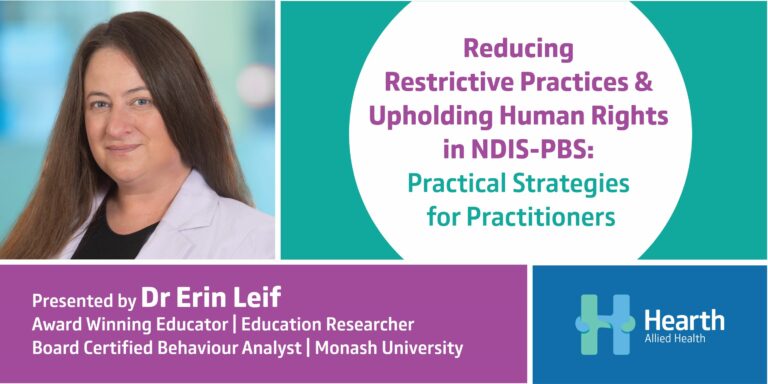Dr Erin Leif Presents Reducing Restrictive Practices and Upholding Human Rights in NDIS-PBS: Practical Strategies for Practitioners
What are Restrictive Practices?
A restrictive practice (RP) is defined as a practice or intervention that has the effect of restricting the rights or freedom of movement of a person, and includes physical, mechanical, and chemical restraint, and seclusion.
If misused or overused, restrictive practices may present serious human rights infringements. In Australia, behaviour support practitioners who deliver behaviour support funded by the National Disability Insurance Scheme (NDIS) are responsible for developing positive behaviour support plans that aim to reduce and eliminate the use of restrictive practices.
The Role of Positive Behaviour Support
Positive behaviour support (PBS) has been proposed as an alternative to the use of restrictive practices when addressing challenging behaviour displayed by people with disability. PBS is underpinned by a conceptual model that views challenging behaviour as functional rather than symptomatic of an underlying deficiency, diagnosis, or mental health disorder.
Within PBS, a constructional approach to intervention is used to increase a person’s repertoire of adaptive behaviour, provide the person with more opportunities to make choices, increase access to preferred and enjoyable life activities, and help the person develop meaningful and positive relationships with others.
The Behaviour Support Practitioner Workforce in Australia
At present, the behaviour support practitioner workforce in Australia is still in its infancy but is growing rapidly. Behaviour support practitioners now have a critical role to play in reducing the use of restrictive practices and protecting and upholding the rights of people with disability.
However, behaviour support practitioners come from diverse backgrounds and have a range of skills and experiences related to the use, reduction, and elimination of restrictive practices as part of the provision of behaviour support.
Specifically, this event will discuss:
In this presentation, we will discuss challenges that behaviour support practitioners may encounter when attempting to reduce and eliminate the use of restrictive practices and practical strategies that might help practitioners address and overcome these challenges. We will also describe practical strategies for delivering PBS in ways that are consistent with the principles described in the United Nations Convention on the Rights of Persons with Disabilities.
Learning objectives:
At the conclusion of this presentation, attendees will be able to:
- Identify different types of restrictive practices.
- Describe ways to reduce the use of restrictive practices as part of the provision of PBS
- Describe ways to uphold the human rights of people with disability as part of the provision of PBS.
Who Should Attend?
Positive Behaviour Support Practitioners seeking to upskill and undertake some Professional Development in Positive Behaviour Support (certificate of attendance to provide to your registration / peak body as evidence of CPD).
NDIS Support Coordinators who are seeking further information about Positive Behaviour Support.
Allied Health Professionals seeking to upskill and undertake some Professional Development in Positive Behaviour Support (certificate of attendance to provide to your registration / peak body as evidence of CPD).
NDIS Participant, Family Members or Support Network who are seeking further information about Positive Behaviour Support and instruction for registering your interest as a potential PBS client with Hearth Allied Health.
TAFE or University Students (Community Services / Psychology / Social Work /Allied Health) seeking a career pathway or employment.
How Can I Attend?
In person & meet the speakers (click here to register) or
Online via Microsoft Teams (click here to register for Microsoft Teams)
Event Details
Date: Wednesday the 1st of March 2023
Time:
- 10.00 – Welcome & Introductions
- 10.15 – Dr Erin Leif’s presentation
- 11.15 – Break
- 11.30 – Discussion Panel
- Dr Erin Leif
- Naomi Anderson – Legal Practice Manager Villamanta Disability Rights Legal Service Inc.
- Dr Chad Bennett – Clinical Director & Consultant Psychiatrist at the Victorian Dual Disability Service .
- Megan Phillips – Hearth Allied Health DIRECTOR OF POSITIVE BEHAVIOUR SUPPORT
- 12.30 – Wrap up & close
Venue: Glen Eira City Council Theatrette corner Glen Eira and Hawthorn Roads, Caulfield
Free Parking Available onsite
Event Cost: Free
Certificate of Attendance: You will be provided with a certificate of attendance via email that can be used as evidence for CPD
I look forward to seeing you there!
General Manager, Hearth Allied Health


